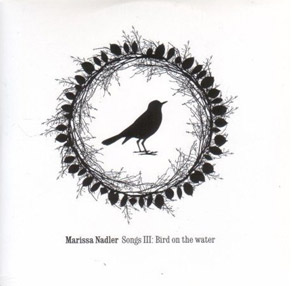Marissa Nadler, "Songs III: Bird on the Water"
 Everything comes together on this, the third album by folk songstress Marissa Nadler, her best yet. This time out, Marissa Nadler's guitar and songwriting skills have advanced by leaps and bounds, and the atmospheric production by Greg Weeks adds the perfect lysergic touch that elevates the album to the status of a contemporary classic of psych-folk.
Everything comes together on this, the third album by folk songstress Marissa Nadler, her best yet. This time out, Marissa Nadler's guitar and songwriting skills have advanced by leaps and bounds, and the atmospheric production by Greg Weeks adds the perfect lysergic touch that elevates the album to the status of a contemporary classic of psych-folk.
Everything that made Ballads of Living and Dying and The Saga of Mayflower May stand out among an overpopulated indie folk subgenre is very much present on Songs III: Bird on the Water. The vocals are just as beautiful and spine-tingling and the songwriting is still top-notch, filled with spooky murder ballads and haunting ghost stories. A canny use of echo, reverb and doubling effects, as on previous albums, helps push the songs into the realm of atmospheric psychedelia. Unlike other popular indie folk acts like Joanna Newsom and Devendra Banhart, Nadler has resisted the temptation to go big band; even with the added instrumentation on some of these tracks, her vocals and precise fingerpicked melodies are still the center of attention. Marissa Nadler, much to her chagrin, will continue to remind people of 1960s British folk artists such as Vashti Bunyan and Celia Humphries, even though her chief influences are on this side of the Atlantic: Leonard Cohen, Joni Mitchell, and Judee Sill.
I don't want to trot out the tired, sexist standby that "behind every great female artist is a man pulling the strings," as that isn't the case here, but a big part of what makes this album special in comparison to Nadler's previous output is the production and added compositional elements of one Greg Weeks. Weeks has been a mainstay of indie music for several years now, with amazing solo albums such as Awake Like Sleep and his band Espers, the only current group which has any claim to the mantle of classic Brit folk groups such as Incredible String Band or Fairport Convention. What he does for Marissa Nadler is to fill out each track with subtle synthesizer drones, atmospheric speaker noise and tape hiss. On a few tracks, Weeks adds his own splashes of acid-addled lead guitar. While Marissa certainly needs no help in the songwriting, singing and guitar-playing department, the added touch of a skilled producer pushes this material over the top into something very special.
The cyclical fingerpicked chords swirl around and gather dust and cobwebs on the opener "Diamond Heart," which will seem hauntingly familiar to anyone who has listened to Marissa's first two albums. Is this familiarity the result of self-plagiarism, or just an identifiably signature style? The answer to this question is not as important as it might at first seem, as repetition and familiarity work in favor of Nadler's music, her music and lyrics seeming to draw from some vast, unconscious archive of Appalachain and British Isles folk and ballad modes. This is not to say that the entire album is self-derivative, as Nadler quickly stakes out new territory with "Dying Breed," which sounds amazingly like the kind of mindbending folk setting engineered by Michael Cashmore and Steven Stapleton for Current 93's early 1990s material. Swirling, phased drones and dusty bell tones circulate around the speaker channels as Marissa's wintry vocals weave in and out, the lyrics bewitching with their esoteric sense imagery: "Red is the color of memory/Blue is the way to green/And darling you did gamble, because you were a dying breed."
"Mexican Summer" is another standout, and quite different from anything else in the Marissa Nadler songbook. Sparse percussion and flourishes of electric guitar fill out the composition, which is one of the happiest, evergreen melodies on an otherwise spooky and melancholic album. "Silvia" makes brilliant use of synthesized organic melodies and Marissa's multitracked vocals, which multiply into a chorus of answering voices at just the right point of the song, transforming the song into a potential pub sing-along. "Rachel" is another favorite of mine, not just because of its beautiful, sad melody that sounds as lovely as anything Bert Jansch ever committed to tape, but also because of Greg Weeks' brilliant third-eye guitar lead, which arrives at a minute and a half into the track and turns the proceedings into something indelibly magical and transporting.
Perhaps the only misstep on the album is Nadler's cover of Leonard Cohen's oft-anthologized song "Famous Blue Raincoat." The song is a kind of open letter to someone from Cohen's past who may be insane, and has probably joined some kind of cult in the desert. Of course, that could just be a series of metaphors, but no matter. What makes Cohen's recording of the song work so well is the fact that he is not insistent on shoehorning every line and verse into the song's melody, and most of the song is performed in his trademark, sardonic method of speak-singing. Nadler is clearly in love with the source material, doing her best to cram the lyrics into the melodic framework, the lyrics subsequently losing their ability to double as an ironic monologue. Nadler's ethereal vocals make the lyric seem light as air, and the words are bereft of their gravity. However, this is only one superfluous track on an otherwise flawless album.
samples:



